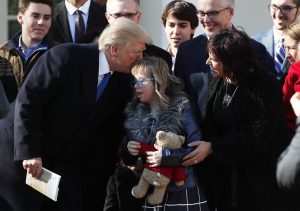
By Richard Cowan
WASHINGTON (Reuters) – The U.S. Senate and House of Representatives were expected to vote on a proposed budget deal on Thursday that would avert another government shutdown but that has angered fiscal conservatives who complain it would lead to a $1 trillion deficit.
The plan to keep the government operating and to increase spending over the next two years faced resistance from conservatives in the Republican Party, who favor less spending on domestic government programs. At the same time, many liberal Democrats wanted to withhold their support as leverage to win concessions on immigration policy.
That meant the bill’s passage was not assured in the House and would need some Democratic support. House Speaker Paul Ryan, a Republican who has backed the agreement, said on Thursday he believed the chamber will pass the budget deal.
“I think we will,” Ryan told radio host Hugh Hewitt. “This is a bipartisan bill. It’s going to need bipartisan support. We are going to deliver our share of support.”
Mark Meadows, chairman of the conservative House Freedom Caucus, called the deal “eye-popping and eyebrow-raising.”
“We took an official position last night to say we can’t support this,” he told CNN on Thursday.
Republicans control both chambers of Congress.
The rare bipartisan deal reached by Senate leaders on Wednesday raises spending on military and domestic programs by almost $300 billion over the next two years.
It would allow for $165 billion in extra defense spending and $131 billion more for non-military programs, including health, infrastructure, disaster relief and efforts to tackle an opioid crisis in the country.
It would stave off a government shutdown before a Thursday night deadline and extend the federal government’s debt ceiling until March 2019, putting off for more than a year the risk of a debt default by the United States.
CONSERVATIVE OPPOSITION
The agreement, backed by Republican President Donald Trump, disappointed conservative House Republicans and outside groups.
“It’s not like Republicans aren’t concerned about disaster relief, or Republicans aren’t concerned about funding community health centers or dealing with the opioid crisis,” U.S. Representative Warren Davidson, a Republican, said in an interview with National Public Radio.
“But when you add them all up, it adds to an awful lot of spending. … It’s not compassionate to bankrupt America.”
Liberal Democrats meanwhile opposed the deal because it does not include an agreement to protect from deportation hundreds of thousands of “Dreamers,” young people brought illegally to the United States as children.
House Democratic leader Nancy Pelosi on Wednesday staged an eight-hour speech on the House floor in support of immigration legislation, including reading letters from Dreamers pleading to be allowed to stay in the United States.
A number of lawmakers who supported the bill acknowledged the deal was not perfect. “It’s not pretty,” Republican U.S. Representative Adam Kinzinger said on CNN.
Democratic Senator Jon Tester said he hoped House Democrats would back the measure. “We don’t want the perfect to get in the road of the good,” he told the cable network.
Republican Senator Lindsey Graham said many lawmakers believe the defense spending in the bill was essential. “We’re going to get it through because most people will support it,” he told Fox News.
Senate Republicans planned a procedural vote on a stand-alone bill to increase military funding for the rest of the year to demonstrate support for Trump’s promised defense build-up.
Democrats will not support it because it does not contain similar spending increases for non-military programs. But the Senate’s failure to advance the bill will not damage the budget legislation, which is due for a vote later in the day.
White House adviser Kellyanne Conway told Fox News the agreement provides long-term certainty in the budget and funding for Trump priorities including infrastructure and military funding.
Failure to agree on spending led to a partial three-day shutdown of government agencies last month.
(Reporting by Makini Brice, Katanga Johnson, Doina Chiacu; Editing by Frances Kerry and Alistair Bell)









